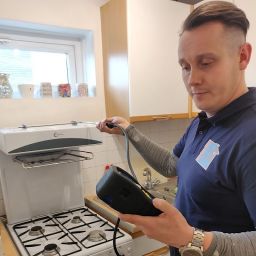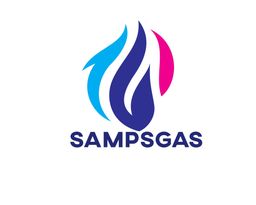



Gas Safety Certificates
What is a Gas Safety Certificate?
Mandatory for all rental properties with fuel-burning appliances, a Gas Safety Certificate, also known as a landlord’s gas safety record or CP12, certifies that a property’s gas appliances have been inspected as required under UK law. To obtain the certificate, you must hire a Gas Safe Registered engineer to inspect the property’s gas appliances to ensure they are safe to use and are not potential sources of gas or carbon monoxide leaks. He will check that the appliances are working properly as well as checking for the following:
- Gas appliances are on the right setting and burning properly with the correct operating pressure
- Harmful gases are removed from the appliance safely to the air outside
- That any ventilation routes are clear and working correctly
- That all the safety devices are working properly
Do I need a Gas Safety Certificate?
If you have your property rented out, or you plan to rent it, you are legally required to have a valid certificate which confirms all of the appliances in the property are safe to use and fit for purpose. If you are using an agent, they will need to be provided with a copy of the CP12 before they are able to move new tenants in. It is the landlords responsibility to do the same in the event of a private rental.
It is worth noting that if an appliance is owned by a tenant, for example a cooker, the landlord is not responsible for having it checked (although the pipework connected to the appliance is the responsibility of the landlord). For private homeowners and households, there is no legal requirement to have a Gas Safety Certificate, however, it is recommended that you still have the checks performed for your own safety and peace of mind.
What happens if you do not have a valid Gas Safety Certificate?
Given the potential seriousness of gas or carbon monoxide leaks, breaches of the Gas Safety (Installation and Use) Regulations 1998 are taken very seriously.Landlords have a duty to provide a safe home for their tenants and failure to do so can result in either a substantial fine, imprisonment or both. The consequences for failure to comply with Gas Safety regulations could include:
- A fine of up to £6,000 for each breach and/or 6 months imprisonment;
- Insurance cover could be invalidated due to non-compliance; and
- If there is loss of life the guilty party could be charged with manslaughter.
Which appliances need to be checked?
When you are booking a Gas Safety Inspection you will be asked to declare how many appliances you need to have checked. For this type of inspection, an appliance is considered to be an appliance which burns fuel such as a gas or LPG boiler, gas hob or cooker or a gas fire. If you have a gas boiler and a gas hob for instance, you would require an inspection on two appliances.
Who can issue a Gas Safety Certificate?
The inspection must be carried out by a Gas Safe Registered Engineer (previously known as CORGI Registered). It’s important to check the heating engineer’s Gas Safe ID card to check what work they are qualified to carry out before you allow them to work in your home.
What does the inspection involve?
Your Gas Safe Registered engineer will check all of the gas appliances on the premises to make sure that they are safe to use and protected against gas or carbon monoxide leaks. He will firstly perform a visual check for any obvious faults, as well as checking for the following:
- Checking of the chimneys and flues for any signs of blockage. Sometimes the engineer will use smoke pellets and trace how much of the smoke escapes the flue. If any returns to the origin, the flue is likely blocked and needs to be cleared.
- Check the gas connections and infrastructure to ensure that the gas supply is delivering gas safely and directly to your gas appliances. The engineer will check if all connections follow safety regulations.
- Checking of the ventilation and oxygen supply. The gas safe engineer will check if enough oxygen is supplied to correctly burn gas.
- Check all of the gas appliances. The engineer lists manufacturer and model information for each gas appliance. They will test how they work and if they burn gas correctly, as per the manufacturer's instructions.
How long does it take?
A typical inspection should take between 30-45 minutes, however, this will vary depending on how many appliances need to be checked and how easy they are for the engineer to access.
What happens after the Gas Safety Certification inspection?
Once the inspection has been carried out your engineer will issue the certificate. Some engineers have moved over to digital versions of the certificate but many still use the hand written paper versions - both of which are valid. Whilst the hand written version is issued on the spot, some digital versions can take around 24 hours to be sent across. Paper versions will include a copy for both the landlord and the tenant, as well as one for the engineer.
The record should detail:
- A description and location of each appliance or flue that was checked
- The name, registration number and signature of the engineer who made the checks
- The date the checks were carried out
- The address of the property where the appliances or flues are installed
- The landlord’s or agent's name and address
- Information on any safety defects and actions needed or taken to fix them
- The results of all operational safety checks carried out on the appliances
Can you fail the inspection?
Yes. Simply having an inspection carried out at the property is sometimes not enough. The engineer needs to confirm that all appliances in the property are safe to use before tenants are able to move in (or remain in the property).
If anything is amiss, the engineer might have to turn off and disconnect the appliance. If there is a simple fix to the problem, they might try to repair the appliance on the spot. However, if there is a need for more serious repair, they will include repair and maintenance recommendations in the report.
Why did your Gas Certification fail?
On the Gas Safety Certificate, it will indicate a pass or a fail if any appliance is “Not Safe to use”. It will explain the findings of each failure (if any) using the codes listed below:
Not to Current Standard (NCS)
When an appliance has been noted as NCS, there is no immediate danger and is relatively safe. Overtime industry standards have changed and for that reason, existing installations may not always meet the current safety requirement.
It is possible to improve the installation to meet current standards as it could improve the reliability and lifespan of the installation. If it is a recent installation, you can contact the engineer that carried out the work to correct any identified faults. For older installations, your gas engineer can advise whether the installation should be brought in line with current standards.
At Risk (AR)
If an installation has one or more recognized faults present, and is considered a danger to life or property without further faults developing, it will be coded as “At Risk.” In which case, with your permission, the installation will be turned off and it is advised that it is not used again until the fault has been repaired.
Immediate Dangerous (ID)
When an installation which, if operated or left connected to a gas supply, is considered to be an immediate danger to life or property. With your permission, the gas engineer will disconnect the appliance and will advise that it is not used until the necessary work has been carried to repair the problem. Continuing use of what is deemed as an “Immediate Dangerous” could put lives in danger.
Because of the potential danger, if you refuse to grant the gas engineer permission to disconnect the appliance or installation, it is his duty to report the situation to the Gas Emergency Service Provider (ESP). The ESP has legal powers to demand entry for the safety of all. The ESP may then disconnect the gas supply to the property.
Legal requirements
Landlords are legally obliged to have their Gas Safety Certificate renewed every year. This must be done on each appliance and installation in all rental properties, as per the Gas Safety (Installation and Use) Regulations 1998. Even if your tenant does not use gas, if there is a live supply at the property, it will need to be checked. If an appliance is owned by the tenant, you as the landlord are not legally responsible to have it inspected but is advised that you remind your tenant to have it checked every year.
If you are a tenant, your landlord must provide you a copy of the Gas Safety Certificate for the property prior to the start of your tenancy. When a new Gas Safety Inspection has been conducted, your landlord must provide a copy of the new CP12 to you within 28 days from the issuing date.
How long does a Gas Safety Certificate last for?
The certificate is valid for one year only and landlords are advised to keep records of at least the previous two years of certificates.
Gas Boiler Service
Regular boiler maintenance is important in order to ensure that the appliance is not only burning safely and efficiently, but also to check for any minor defaults and make sure they do develop into more serious problems. The service typically lasts at least 30 minutes and varies depending on the type of boiler, complexity of the system and how easily the engineer is able to get access to inspect the system.
Choose an experienced Gas Safe registered engineer to maintain your boiler according to the UK Gas Safety standards. You should not forget to ask for the burn control sheet from the engineer after the maintenance is completed. Standard annual maintenance costs typically range from £60-100.
You can read more about the Gas Boiler Service, here.internal://00891989-e7c1-446c-97af-cadd2953eccc
